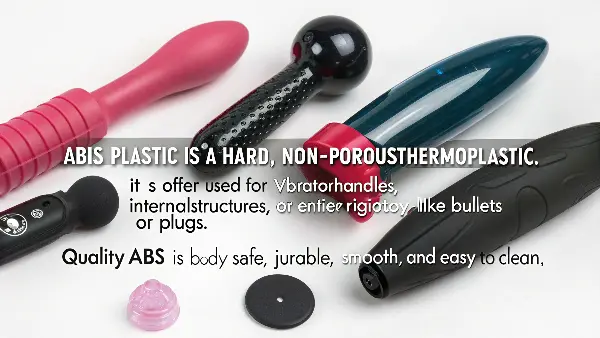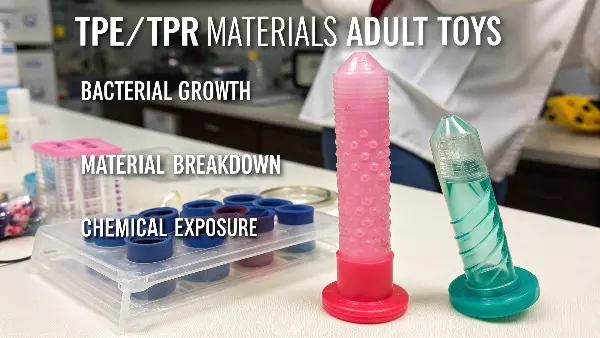Choosing materials for your adult product line can feel confusing. Making the wrong choice risks quality issues, customer complaints, even safety concerns. Understanding the key differences helps you select the best materials for your brand and your customers’ well-being.
Body-safe silicone is the top choice for direct body contact due to its non-porous, hypoallergenic nature. ABS plastic is a safe, rigid option often used for handles or specific designs. TPE/TPR materials are cheaper but porous and carry significant hygiene and safety risks, making them unsuitable for quality brands.
As a brand owner or sourcing manager, the materials you choose directly reflect your commitment to quality and customer safety. It’s not just about feel; it’s about trust and building a reputation. Poor material choices can lead to product returns, bad reviews, and damage your brand image. Let’s dive deeper into each material so you can make informed decisions for your product line. Understanding these details is crucial for building a reputable brand that customers rely on for safe and pleasurable experiences.
Why is Body-Safe Silicone the Gold Standard for Adult Toys?
You want the absolute safest and best-feeling material for your customers’ most intimate products. Using lesser materials introduces risks of irritation, allergic reactions, or even infection. Body-safe silicone provides unmatched safety, comfort, and durability, making it the premium choice for discerning brands and users.
Body-safe silicone is non-porous, meaning it won’t harbor bacteria if cleaned correctly. It’s hypoallergenic, free from phthalates and latex, feels soft and skin-like, warms to body temperature, and is durable and easy to sterilize. This makes it the safest, most hygienic option available for adult products.
!
In my years running PrivyPlay and overseeing manufacturing, settling for anything less than the best silicone was never an option. We know that the material touching the most sensitive skin must be impeccable. Body-safe silicone, often referred to as medical-grade silicone, stands out for several key reasons. Its non-porous surface is the most critical feature. Unlike porous materials that have microscopic holes, silicone has a smooth, solid structure. This prevents bacteria, fungi, and viruses from getting trapped inside the material, making it incredibly hygienic. Proper cleaning with soap and water or a dedicated toy cleaner effectively removes contaminants from the surface. Many silicone toys can even be boiled for complete sterilization, offering ultimate peace of mind.
Beyond safety, the feel of silicone is luxurious. It’s soft, smooth, and has a unique quality of warming up to body temperature during use, making it feel more natural and comfortable. It’s also hypoallergenic, meaning it’s very unlikely to cause allergic reactions, and it’s free from harmful chemicals like phthalates, BPA, and latex often found in cheaper plastics. Durability is another plus; high-quality silicone resists wear and tear, doesn’t degrade easily, and maintains its shape and texture over time. Remember the golden rule: always use water-based lubricants with silicone toys, as silicone-based lubes can cause the material to break down. Choosing silicone signals a commitment to quality your customers will appreciate.
When is Hard ABS Plastic a Good Choice for Adult Products?
Sometimes your product design needs rigidity or a hard surface, maybe for a handle, a control button area, or a specific type of stimulator. Soft, flexible silicone can’t always provide that necessary structure or hardness. High-quality ABS plastic offers a safe, durable, non-porous alternative for these components or even for entire rigid toys.
ABS plastic is a hard, non-porous thermoplastic. It’s often used for vibrator handles, internal structures, or entire rigid toys like bullets or plugs. Quality ABS is body-safe, durable, smooth, and easy to clean, making it suitable for components or products not requiring softness or flexibility.

While silicone is fantastic for direct, soft contact, some designs just need a different material property. Think about the handle of a wand vibrator or the casing for the electronics and motor. This is where ABS (Acrylonitrile Butadiene Styrene) plastic often comes in. It’s a common thermoplastic known for its strength, rigidity, and impact resistance. When sourced from reputable suppliers and manufactured correctly, ABS is a body-safe option. Like silicone and glass, it is non-porous. This means it doesn’t have those tiny holes where bacteria can hide, making it hygienic and easy to clean with simple soap and water.
ABS provides a very different feel compared to silicone. It’s hard and smooth, and it doesn’t warm up with body heat. This rigidity is its main advantage for specific applications. It provides structural integrity for internal mechanisms or creates a firm handle for better control. Some entire toys, like certain bullet vibrators or kegel balls, might be made entirely of ABS. It’s also generally compatible with all types of lubricants – water-based, silicone-based, and oil-based – although water-based is always a simple, safe choice. At PrivyPlay, when a design calls for rigidity, we ensure we use high-grade, body-safe ABS plastic. The key is quality; cheap, poorly manufactured ABS could potentially contain impurities, so vetting your supplier is crucial. It’s a functional material that complements silicone well in many product designs.
What Are the Risks of Using TPE/TPR Materials in Adult Toys?
Lower costs might make TPE or TPR materials seem attractive for production, especially when trying to hit a lower price point. But these apparent savings often come with hidden dangers like potential bacterial growth, material breakdown, and possible chemical exposure for the user. Understanding these significant drawbacks is vital to protect your customers and your brand’s reputation.
TPE (Thermoplastic Elastomer) and TPR (Thermoplastic Rubber) are porous materials. This means they can trap bacteria deep within the material even after cleaning, posing serious hygiene risks. They can also degrade over time, become sticky or oily, may contain harmful phthalates, and are generally less durable and body-safe than silicone.
 Let’s be direct: as a brand owner focused on quality and safety, you should generally avoid TPE and TPR materials, especially for insertable products. While they can feel soft and rubbery, sometimes mimicking silicone to the untrained eye (or hand), their fundamental structure is problematic. The primary issue is porosity. TPE/TPR materials have microscopic pores, like a sponge. Bodily fluids, lubricants, and bacteria can seep into these pores. Even with thorough washing, you might only clean the surface, leaving contaminants trapped inside. This creates a breeding ground for bacteria, mold, and fungi, which can lead to infections or irritation with subsequent use. Unlike silicone, these materials cannot be reliably sterilized by boiling. Furthermore, TPE/TPR materials are less stable than silicone. They can degrade over time, especially when exposed to certain lubricants (use water-based only, and even then, incompatibility can occur), cleaning agents, or even just air and light. This degradation can make the toy feel sticky, oily, or brittle. Perhaps most concerning is that TPE/TPR formulations, particularly cheaper ones, may contain phthalates – chemicals used to soften plastics that have been linked to potential health issues. They also often have a noticeable chemical odor. While the initial cost saving is tempting, the potential risks to customer health and the inevitable quality issues damage brand trust. Here’s a quick comparison: |
Feature | Body-Safe Silicone | Quality ABS Plastic | TPE / TPR |
|---|---|---|---|---|
| Porosity | Non-Porous | Non-Porous | Porous | |
| Body Safety | Excellent | Good | Poor to Fair | |
| Hygiene | Excellent (Sterilizable) | Good | Poor | |
| Feel | Soft, Smooth, Warms Up | Hard, Smooth | Soft, Rubbery, Varies | |
| Durability | Excellent | Good | Fair to Poor | |
| Degradation | Minimal | Minimal | Can Degrade/Sticky | |
| Phthalates | Phthalate-Free | Phthalate-Free | May Contain | |
| Lube | Water-Based Only | Most Types OK | Water-Based Only | |
| Cost | Higher | Moderate | Lower |
At PrivyPlay, we exclusively use high-quality, body-safe silicone and, where appropriate, safe ABS plastic. We refuse to compromise on safety by using porous materials like TPE/TPR. Your customers deserve better, and your brand reputation depends on it.
Conclusion
Choosing the right material for your adult products is crucial for safety, quality, and brand trust. Body-safe silicone stands out as the superior choice for most applications due to its safety and feel. ABS offers safe rigidity when needed. Avoid TPE/TPR due to significant hygiene risks. Prioritize quality materials, like we do at PrivyPlay, for customer satisfaction and long-term brand success.
